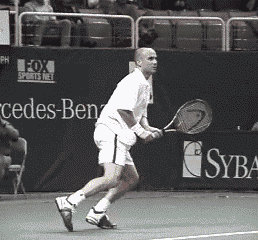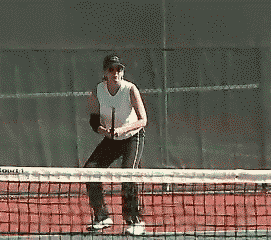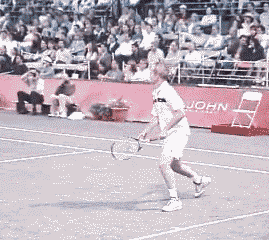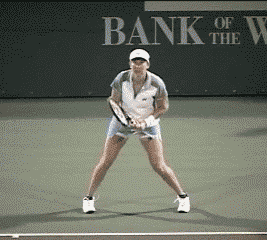|
TennisOne Lessons


Negativity
Happy Bhalla
Feel is the most essential fundamental if one wishes to excel as a tennis player. There is only one way to develop feel: through trial and error. No amount of reading, listening or studying can help you in this endeavor. Often, negativity on the court arises after errors in the mistaken belief that errors are bad. Obviously, on a short-term, result-oriented, superficial level errors are bad.
 Bio-mechanically sound execution will be consistent with the natural movements of the muscles and joints.
Bio-mechanically sound execution will be consistent with the natural movements of the muscles and joints. |
However, when one looks deeper and takes a broader perspective, and if one is tuned into becoming the best tennis player one can be, then, in a way, errors are good because they help you develop the feel that will ultimately determine how well you will play this game. Errors, winners. miss-hits or well hit shots are all an essential part of the learning process because it is through these varied experiences that feel is developed.
Technical: Observe, don't judge!
The root of good technique is feel. Good technique does not happen in some scientific laboratory, but on the tennis court by hitting balls. If one is relaxed, open-minded and perhaps guided ever so little, good technique will happen. Good technique is natural for the body, it is not something that one needs to struggle with, unless one already has poor technique. Bio-mechanically sound execution will be consistent with the natural movements of the muscles and joints. If one is relaxed, smooth and graceful, sound movement will often result. A great deal of the awkwardness found on the club scene is a result of tension.
Negativity is mental activity; it is a judgment of what happened. Negativity is not silence; consequently, negativity creates an obstacle to developing feel. You hit a ball well and that has a certain feel to it; you hit a ball poorly and that also has a certain feel to it. If you can remain silent and present through both experiences, your body will develop a greater sensitivity. This greater sensitivity to the experience of hitting a ball is feel and developing feel will ultimately improve your technical ability to strike a ball. Feel is something learned by and for the body; the conscious mind is not needed for it to happen. Technique very rarely fluctuates from day to day, but performances and players' ability to execute does; in my understanding the root of these fluctuating fortunes is mental and not technical.
 A great deal of the awkwardness found on the club scene is a result of tension.
A great deal of the awkwardness found on the club scene is a result of tension. |
Play every point the same!
To play at the highest level of this game, shot selection must be instinctual. The conscious mind is simply too slow to make the necessary decisions while the point is being played. Being negative can lead to tentativeness or over-hitting and an inability to execute shots freely in a loose and relaxed way. If missing is so painful, then obviously one will be less willing to hit out and play instinctively or one will hit out without being centered, either way disaster will result.
Basically, anger, frustration and negativity affects judgment. Shot selection needs to be made on specific criterion and one needs to be present to the situation (relaxed intensity) to make these judgments accurately.
Emotional: Let-Go!
Tennis, because of its high skill level requires a certain mind-body balance and a wide range of fluctuating emotions make it extremely difficult to return to that centered balance immediately. It is extremely difficult to become angry and frustrated and 25 or 90 seconds later muster the physiological centeredness necessary to hit balls precisely. That is why, for emotional players the tempo of a match spurts and stutters rather than flows. The emotional highs and lows make a constant flow impossible. To let go of the last shot, be it a winner or an error, is essential if peak performance is to happen.
 John McEnroe often let his emotions get out of control, however, he seemed to be that rare player who could harness that energy.
John McEnroe often let his emotions get out of control, however, he seemed to be that rare player who could harness that energy. |
Emotion is a double-edged sword and a very untrustworthy friend if one wishes to excel at this game. Positive emotions do not exist in a vacuum, consequently, when you invite these emotions in, you will discover that the negative emotions have also walked in through the back door.
Negative emotions create tension in the body and extended periods of holding on to tension will physically drain the body, thus making it susceptible to fatigue and all kinds of injuries.
Ultimately, being negative indicates that one is not confident about oneself or in one's ability to play this game. This is significant not because of the weakness it shows to one's opponent, but because of the doubt it reflects at the root. You do not need false bravado, but doubt will not allow you to reach your potential because it will not allow you to swing freely or play loosely.
Also, becoming negative reveals the inability to accept responsibility. To become frustrated and angry is an inappropriate response because it does not help in any way whatsoever. It is bailing out, instead of facing adversity boldly in the face and searching deep within oneself for a solution. When you can do that consistently, you will become a much better competitor.
Spiritual: The bottom line is peace of mind!
Constant negativity, make no mistake, is intrinsically painful. Many competitive players have tremendous talent, but unfortunately all these skills have brought them no intrinsic joy or peace of mind from playing this game. Is there any value to success or material abundance, if spiritual well-being does not accompany it?
 The ability to accept themselves allows
The ability to accept themselves allows
the top players to perform freely, without fear of failure. |
The ability to accept and love oneself allows us to live freely without fear of failure. In the athletic arena, this feeling of well-being is essential if we are to realize our full potential. Conversely, the fear of failure that is at the root of all negativity, will never allow you to live fully or to play to your very best.
The long-term key to transcendence of the negativity is understanding, on some level, the nature of these emotions and its consequences on the individual and on his performance. This understanding will reveal that all negativity and fear is coming from one's own mind. The root is the mind and one could analyze each individual episode, or one could simply go to the root. The root would be cutting off all mental activity. When one is silent, one is present and when one is present to the moment no negativity can enter. Peak performance happens in that silence, which is both relaxed and intense at the same time. Find that balance and you have unearthed a great treasure!
Your comments are welcome. Let us know what you think about Happy Bhalla's article by emailing us here at TennisOne.
|
|




